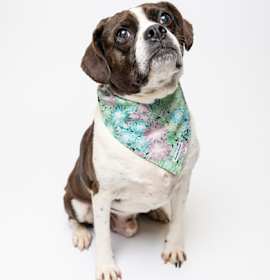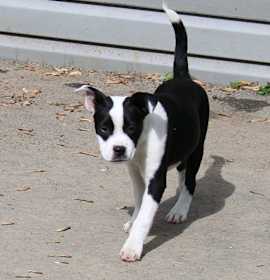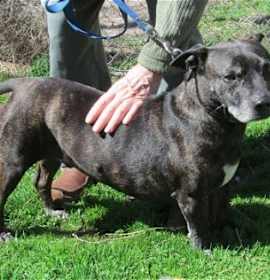Boston Terriers weigh between 15 and 29 pounds and stand around 14 to 16 inches tall. They are a small- to medium-sized dog breed.
Boston Terrier
Breed Type: Non-Sporting
Common nicknames: Bostons, Boston Bull, Boxwood, American Gentleman
Coat: Smooth
Hypoallergenic: No, they will likely trigger allergies.
Temperament: Friendly, playful, adaptable, affectionate
Life expectancy: 11-13 years
Color & patterns:

Meet the Boston Terrier, a breed known for their expressive faces and tuxedo-like markings. These little pups are equal parts adorable and sassy; they have playful, friendly personalities, and are bundles of energy. They are also known for being little clowns, always ready to make you laugh with their silly antics. When not making you laugh with their quirky behavior, they love nothing more than cuddling up with their humans on the couch. These dogs are also eager to please and intelligent, which makes them easy to train — a great trait for first-time dog pet parents. Originally bred for dogfighting, the Boston Terrier has come a long way to become the lovable family pet that they are today. They were one of the first breeds developed in the United States, and with their compact size and easy-going nature, Boston Terriers are great for apartment living. So, if you’re looking for a dog who is equal parts cute and spunky, the Boston Terrier might just be the perfect pup for you.
Boston Terrier characteristics
Learn about about Boston Terrier basics like their fur colors, shedding levels, how much grooming they need, and other Boston Terrier facts.
Average height
14-16 inches (35.6-40.6cm)
Average weight
15-29 pounds (6.8-13.2 kg)
Average lifespan
11-13 years
Exercise needs
Grooming needs
Full-grown size
Good with cats
Good with kids
Training aptitude
What is the rarest Boston Terrier color?
The rarest Boston Terrier color is solid black. While black is a standard color for Boston Terriers, those with solid black coats, where the entire body lacks any white patches or markings, are relatively uncommon compared to other color variations.
Which colors are Boston Terriers?
Boston Terriers are black and white, brindle and white, or seal (a dark brown/black) and white. The white markings typically appear on their chests, faces, and feet, while the primary color covers the rest of their bodies. Less common color variations may include solid black, solid brindle, or combinations of other colors with white markings.
What does a Boston Terrier look like?
Boston Terriers are small, muscular dogs with distinctive, tuxedo-like patterns, typically consisting of a black or brindle coat with white markings on the chest and face. They have square-shaped heads with short, broad muzzles, large, round eyes, and small, erect ears.
How long does a Boston Terrier live?
Boston Terriers live between 11 and 13 years. Providing proper veterinary care, nutrition, regular exercise, and a safe environment can help maximize the lifespan of a Boston Terrier.
What is a Boston Terrier?
The Boston Terrier is a small, lively breed of dog known for its tuxedo-like coat markings and friendly nature. They are often referred to as “American Gentlemen” due to their refined appearances and charming personalities.
When is a Boston Terrier full-grown?
Boston Terriers will become fully grown between 12 and 18 months of age. But like many dog breeds, they may continue to fill out and develop muscle until they are around two years old.
Which two breeds make up a Boston Terrier?
The two breeds that make a Boston Terrier are the English Bulldog and the now-extinct White English Terrier.
Do Boston Terriers shed?
Yes, Boston Terriers shed, but they are considered light to moderate shedders. They have short, smooth coats that shed year-round, with heavier shedding typically occurring during spring and fall seasonal changes. Regular grooming, such as brushing their coats weekly, can help minimize shedding and keep their coats healthy.
Boston Terrier history
Learn about where this Boston Terrier came from!
What is a Boston Terrier bred for?
Today, Boston Terriers are bred for companionship, but initially, Boston Terriers were bred for pit-fighting. Earlier versions of the Boston Terrier were taller and heavier; they were later bred to be smaller by the 1950s. As the breed evolved, they became more popular as companion animals due to their friendly personalities.
Where are Boston Terriers from?
Boston Terriers originated in the United States, specifically in the city of Boston, Massachusetts. They were developed in the late 19th century through crossbreeding efforts involving English Bulldogs and White English Terriers (which are now extinct).
Boston Terrier temperament
Learn about about the Boston Terrier temperament and how well they fit into your lifestyle, home environment, and family.
Are Boston Terriers good with kids?
Yes, Boston Terriers are good with kids. They enjoy playing and interacting with kids, and their small size makes them less intimidating to young children. These pups make great couch potatoes and playmates alike. They are playful, energetic, and great companions, known to be good playmates to children.
As with any breed, it is recommended that your child is always supervised when interacting with your Boston Terrier to keep both the child and dog safe. Teaching children how to properly approach and handle dogs is crucial to ensure positive experiences for both the dog and the child, as is teaching dogs how to interact gently with children.
Is a Boston Terrier a good family dog?
Yes, a Boston Terrier is a good family dog. Boston Terriers typically form strong bonds with their humans and enjoy participating in family activities. They are known for their friendly and affectionate nature and make wonderful companions for people of all ages, including children and seniors.
That said, as with any breed, it is recommended that your child is always supervised when interacting with your dog to keep both the child and dog safe. Teaching children how to properly approach and handle dogs is crucial to ensure positive experiences for both the dog and the child, as is teaching dogs how to interact gently with children.
Are Boston Terriers easy to train?
Yes, Boston Terriers are easy to train if the right training methods are used. They are intelligent and eager to please but also have stubborn streaks, which can present challenges during training sessions. Consistency, positive-reinforcement techniques, and patience are key when training Boston Terriers. Just keep in mind that even if a certain dog breed is known to be easy to train, training a dog requires a long-term commitment.
Are Boston Terriers good dogs?
Yes, Boston Terriers are good dogs. They are friendly, playful, and adaptable to various living situations, including apartments. Their small sizes, minimal exercise requirements, and manageable grooming needs also contribute to their popularity.
Are Boston Terriers good with cats?
Yes, Boston Terriers are good with cats, especially if they are introduced to them at a young age and properly socialized. Some Boston Terriers may have a higher prey drive or be more assertive, which could potentially lead to conflicts with cats. Proper supervision and gradual introductions are essential to ensure positive relationships between Boston Terriers and cats in the same household.
Are Boston Terriers good with other dogs?
Yes, Boston Terriers are good with other dogs, especially if they are properly socialized from a young age and introduced to other dogs in a positive, controlled manner. However, as with all breeds, individual temperament and personality will play a significant role in how well a Boston Terrier interacts with other dogs.
Are Boston Terriers smart?
Yes, Boston Terriers are smart. These pups are known for their quick learning abilities, problem-solving skills, and adaptability.
Can a Boston Terrier be a service dog?
Yes, a Boston Terrier can be a service dog, although they may not be as commonly chosen for this role compared to other breeds. Service dogs perform specific tasks to assist individuals with disabilities, such as guiding the visually impaired, providing mobility assistance, or detecting medical emergencies. While Boston Terriers are intelligent and trainable, their small size may limit their ability to perform certain tasks required of service dogs, such as providing physical support or assistance with mobility-related tasks.
Are Boston Terriers good first dogs?
Yes, Boston Terriers are good first dogs. They are friendly, affectionate, and adaptable, which can make them great companions for individuals who may be new to pet parenting.
Do Boston Terriers bark a lot?
No, Boston Terriers don’t tend to bark a lot. While they may bark to alert their pet parents to potential intruders or unfamiliar situations, they do not tend to be as vocal as some other small dog breeds. As with any dog, proper training and exercise can discourage nuisance barking.
Are Boston Terriers good apartment dogs?
Yes, Boston Terriers are good apartment dogs and a great pet for urban living. They are small, adaptable to various living environments, and do not require a large yard for exercise.
Boston Terrier health
Learn about about the Boston Terrier health outlook and what diseases they may be prone to at various stages of their life.
Is the Boston Terrier a healthy dog?
Yes, Boston Terriers can be healthy dogs when cared for properly. But pet parents should be aware of certain health conditions they’re more prone to, including:
Brachycephalic syndrome: Boston Terriers have a brachycephalic (short-nosed) facial structure, which can predispose them to breathing difficulties. Brachycephalic syndrome may lead to various respiratory issues, such as stenotic nares (narrow nostrils), elongated soft palates, and tracheal collapse, which causes symptoms like snoring, wheezing, and exercise intolerance.
Patellar luxation: Patellar luxation is a condition in which the kneecap dislocates from its normal position. This causes lameness, pain, and difficulty moving. Boston Terriers, like many small breeds, can be prone to this orthopedic issue, which may require surgical correction in severe cases.
Allergies: Boston Terriers may develop sensitivities to environmental allergens, food ingredients, or parasites, leading to symptoms such as itching, skin inflammation, and recurrent ear infections. Identifying and managing allergies through veterinary guidance, dietary changes, and allergen avoidance strategies are essential for maintaining their comfort and health.
Megaesophagus: Megaesophagus occurs when the esophagus becomes enlarged, which makes it difficult for your dog to pass food properly. A dog’s inability to pass food properly can cause food and liquid to accumulate in the esophagus. Megaesophagus is not generally life-threatening but can lead to vomiting, coughing, nasal discharge, and malnutrition. There is no cure for megaesophagus, but diet changes can help your pup get the proper nutrients he needs to stay healthy.
Eye problems: Boston Terriers are susceptible to various eye conditions, including cherry eye (prolapsed gland of the third eyelid), cataracts, glaucoma, and corneal ulcers. Regular eye examinations by a veterinarian are important for early detection and management of these issues, to prevent vision impairment or discomfort.
Deafness: While not exclusive to the breed, Boston Terriers can inherit a genetic predisposition to deafness, particularly in those with a predominantly white-coat coloration. Regular auditory testing and awareness of signs suggestive of hearing loss can help identify and address deafness in affected dogs.
Is a Boston Terrier hypoallergenic?
No, a Boston Terrier is not hypoallergenic. They have short, smooth coats that shed moderately, releasing dander and allergens into the environment. Boston Terriers also produce saliva and skin oils that can also contribute to allergies in sensitive individuals.
Do Boston Terriers need a lot of exercise?
No, Boston Terriers don’t need a lot of exercise. Although they enjoy daily walks and playtime, they do not require extensive amounts of exercise to stay healthy and happy. A couple of short walks per day, along with some interactive playtime, can meet their exercise needs.
Popular Boston Terrier mixes
Breeds that are commonly mixed with Boston Terriers include Basset Hounds, Shih Tzus, and Poodles. Characteristics of a Boston Terrier mix can vary widely depending on the specific breeds involved, the individual dog’s genetics, and its upbringing. A few common Boston Terrier mixes include:
Basston (Boston Terrier + Basset Hound)
BoShi (Boston Terrier + Shih Tzu)
Bossi-Poo (Boston Terrier + Poodle)
Bostinese (Boston Terrier + Pekingese)

Find Boston Terrier puppies near you
Adopting a Boston Terrier
Learn about acquiring a Boston Terrier - the pros and cons of adopting versus going through a breeder, and associated costs.

Toshy
Boston Terrier
Male, 7 yrs 3 mos
Columbus, OH
Not good with dogs
Not good with cats

Fiona
Boston Terrier Terrier (Unknown Type, Small)
Female, 2 mos
Lewis Center, OH
Not good with dogs
Not good with cats

TESS
Boston Terrier Chihuahua
Female, 2 yrs 2 mos
Columbus, OH
Good with dogs
Not good with cats
House-trained
Spayed or Neutered
Shots are up-to-date

Zeus
Boston Terrier
Male, senior
Sunbury, OH
Good with dogs
Not good with cats
House-trained
Spayed or Neutered
Shots are up-to-date

Toshy
Boston Terrier
Male, 7 yrs 3 mos
Columbus, OH
Not good with dogs
Not good with cats

Fiona
Boston Terrier Terrier (Unknown Type, Small)
Female, 2 mos
Lewis Center, OH
Not good with dogs
Not good with cats

TESS
Boston Terrier Chihuahua
Female, 2 yrs 2 mos
Columbus, OH
Good with dogs
Not good with cats
House-trained
Spayed or Neutered
Shots are up-to-date

Zeus
Boston Terrier
Male, senior
Sunbury, OH
Good with dogs
Not good with cats
House-trained
Spayed or Neutered
Shots are up-to-date
